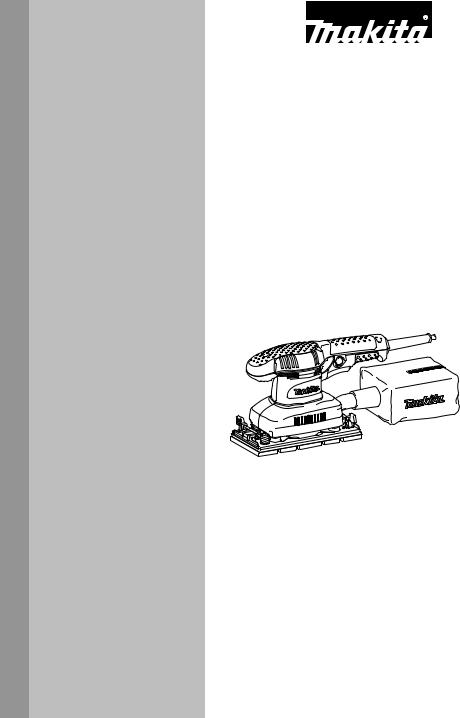Makita BO3711, BO3710, BO3710X Manual

instructions) (Original ENGLISH
INSTRUCTION MANUAL
Finishing Sander
BO3710
BO3711
010213
 DOUBLE INSULATION
DOUBLE INSULATION
 WARNING:
WARNING:
For your personal safety, READ and UNDERSTAND before using. SAVE THESE INSTRUCTIONS FOR FUTURE REFERENCE.

ENGLISH (Original instructions)
SPECIFICATIONS
Model |
BO3710 |
|
BO3711 |
Pad size |
|
93 mm x 185 mm |
|
Abrasive paper size |
|
93 mm x 228 mm |
|
Orbits per minute (min-1) |
11,000 |
|
4,000 - 11,000 |
Overall length |
|
253 mm |
|
Net weight |
|
1.6 kg |
|
Safety class |
|
|
/II |
•Due to our continuing programme of research and development, the specifications herein are subject to change without notice.
•Specifications may differ from country to country.
•Weight according to EPTA-Procedure 01/2003
END201-5
Symbols
The following show the symbols used for the equipment. Be sure that you understand their meaning before use.
Read instruction manual.
DOUBLE INSULATION
Only for EU countries
Do not dispose of electric equipment together with household waste material! In observance of European Directive 2002/96/EC on waste electric and electronic equipment and its implementation in accordance with national law, electric equipment that have reached the end of their life must be collected separately and returned to an environmentally compatible recycling facility.
ENE052-1
Intended use
The tool is intended for the sanding of large surface of wood, plastic and metal materials as well as painted surfaces.
ENF002-1
Power supply
The tool should be connected only to a power supply of the same voltage as indicated on the nameplate, and can only be operated on single-phase AC supply. They are double-insulated in accordance with European Standard and can, therefore, also be used from sockets without earth wire.
ENG104-1
For European countries only Noise
The typical A-weighted noise level determined according to EN60745:
Sound pressure level (LpA) : 72 dB(A) Uncertainty (K) : 3 dB(A)
The noise level under working may exceed 80 dB (A).
Wear ear protection.
ENG211-2
Vibration
The vibration total value (tri-axial vector sum) determined according to EN60745:
Work mode : sanding metal plate Vibration emission (ah) : 3.5 m/s2 Uncertainty (K) : 1.5 m/s2
ENG901-1
•The declared vibration emission value has been measured in accordance with the standard test method and may be used for comparing one tool with another.
•The declared vibration emission value may also be used in a preliminary assessment of exposure.
 WARNING:
WARNING:
•The vibration emission during actual use of the power tool can differ from the declared emission value depending on the ways in which the tool is used.
•Be sure to identify safety measures to protect the operator that are based on an estimation of exposure in the actual conditions of use (taking account of all parts of the operating cycle such as the times when the tool is switched off and when it is running idle in addition to the trigger time).
ENH101-12
EC Declaration of Conformity
We Makita Corporation as the responsible manufacturer declare that the following Makita machine(s):
Designation of Machine:
Finishing Sander
Model No./ Type: BO3710,BO3711 are of series production and
Conforms to the following European Directives:
98/37/EC until 28th December 2009 and then with 2006/42/EC from 29th December 2009
And are manufactured in accordance with the following
2

standards or standardised documents: EN60745
The technical documentation is kept by our authorised representative in Europe who is:
Makita International Europe Ltd, Michigan, Drive, Tongwell,
Milton Keynes, MK15 8JD, England
30th January 2009
000230
Tomoyasu Kato
Director
Makita Corporation
3-11-8, Sumiyoshi-cho,
Anjo, Aichi, JAPAN
GEA005-3
General Power Tool Safety Warnings
 WARNING Read all safety warnings and all instructions. Failure to follow the warnings and instructions may result in electric shock, fire and/or serious injury.
WARNING Read all safety warnings and all instructions. Failure to follow the warnings and instructions may result in electric shock, fire and/or serious injury.
Save all warnings and instructions for future reference.
The term "power tool" in the warnings refers to your mains-operated (corded) power tool or battery-operated (cordless) power tool.
Work area safety
1.Keep work area clean and well lit. Cluttered or dark areas invite accidents.
2.Do not operate power tools in explosive atmospheres, such as in the presence of flammable liquids, gases or dust. Power tools create sparks which may ignite the dust or fumes.
3.Keep children and bystanders away while operating a power tool. Distractions can cause
you to lose control.
Electrical safety
4.Power tool plugs must match the outlet. Never modify the plug in any way. Do not use any adapter plugs with earthed (grounded) power tools. Unmodified plugs and matching outlets will reduce risk of electric shock.
5.Avoid body contact with earthed or grounded surfaces such as pipes, radiators, ranges and refrigerators. There is an increased risk of electric shock if your body is earthed or grounded.
6.Do not expose power tools to rain or wet conditions. Water entering a power tool will
increase the risk of electric shock.
7.Do not abuse the cord. Never use the cord for carrying, pulling or unplugging the power tool. Keep cord away from heat, oil, sharp edges or moving parts. Damaged or entangled cords increase the risk of electric shock.
8.When operating a power tool outdoors, use an extension cord suitable for outdoor use. Use of a cord suitable for outdoor use reduces the risk of electric shock.
9.If operating a power tool in a damp location is unavoidable, use a residual current device (RCD) protected supply. Use of an RCD reduces the risk of electric shock.
10.Use of power supply via a RCD with a rated residual current of 30mA or less is always recommended.
Personal safety
11.Stay alert, watch what you are doing and use common sense when operating a power tool. Do not use a power tool while you are tired or under the influence of drugs, alcohol or medication. A moment of inattention while operating power tools may result in serious personal injury.
12.Use personal protective equipment. Always wear eye protection. Protective equipment such as dust mask, non-skid safety shoes, hard hat, or hearing protection used for appropriate conditions will reduce personal injuries.
13.Prevent unintentional starting. Ensure the switch is in the off-position before connecting to power source and/or battery pack, picking up or carrying the tool. Carrying power tools with your finger on the switch or energising power tools that have the switch on invites accidents.
14.Remove any adjusting key or wrench before turning the power tool on. A wrench or a key left attached to a rotating part of the power tool may result in personal injury.
15.Do not overreach. Keep proper footing and balance at all times. This enables better control of the power tool in unexpected situations.
16.Dress properly. Do not wear loose clothing or jewellery. Keep your hair, clothing, and gloves away from moving parts. Loose clothes, jewellery or long hair can be caught in moving parts.
17.If devices are provided for the connection of dust extraction and collection facilities, ensure these are connected and properly used.
Use of dust collection can reduce dust-related hazards.
3
